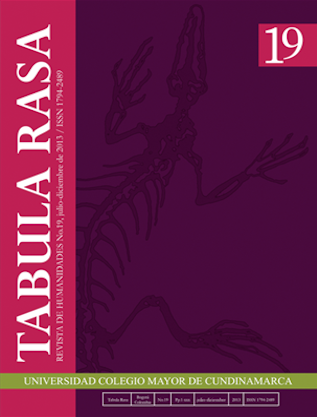Of failure and frustration in field work —how to assume the ethics of representation in participatory research
De fracaso y frustración en el trabajo de campo: como asumir la ética de representación en investigación participativa
Show authors biography
Collaborative research is back on the agenda these days. It has certainly become more accepted in mainstream academia than back in the 1970s, when Orlando Fals Borda and others developed what came to be known as Participatory Action-Research (PAR). Research councils are increasingly interested in funding collaborative research proposals, seemingly willing to listen to and learn from the experiences of subaltern groups. Surprisingly maybe, much collaborative research reinvents itself today without reference to the pioneering work of Fals Borda and others. One of the lacunas of methodological engagement is the lack to address issues of fracaso, or failure, where the academic-activist him/herself has experienced deep disappointment or frustration in the way the research situation unfolded on the ground. In this article, I want to reflect on a collaborative research experience that I have been involved in and critically think through those situations that resulted in personal disappointment, as I was facing the limitations in the field of my maybe too naïve approach to collaborative research. I have so far refrained from writing about these issues, as they pose significant ethical problems in possibly identifying research partners, who are part of this story of disappointment. However, I believe that it is only through critically examining and addressing the failures and frustrations of collaborative research agendas that those disappointments may be avoided in the future. How to write about these failures is a question not easily answered.
Article visits 107 | PDF visits 76
Downloads
Bachelard, G. 1994 [1958]. The poetics of space. Boston: Beacon Press.
Bunge, W. 1977. “The first years of the Detroit Geographical Expedition: A personal report”. En: R. Peet (ed.), Radical geography: Alternative viewpoints on contemporary social issues. 31-39. Londres: Methuen.
Escobar, A. 2008. Territories of difference: Place, movements, life, redes. Durham: Duke University Press.
Esteva, G. 1987. “Regenerating people’s space”. Alternatives, 12: 125-152.
Fals Borda, O. 1979-1986. Historia doble de la costa (4 volúmenes). Bogotá: Editores Carlos Valencia.
Fals Borda, O. 1987. “The application of participatory action-research in Latin America”. International Sociology, 2(4): 329-347.
Freire, P. 1971. Pedagogy of the oppressed. Nueva York: Herder and Herder.
Hooks, B. 1991. yearning: race, gender, and cultural politics. Londres: Turnaround.
Johns, R. 2002. A theory of physical probability. Toronto: University of Toronto Press.
Kropotkin, P. 1995 [1899]. Fields, factories and workshops. Londres: Freedom Press.
Mignolo, W. 2005. The idea of Latin America. Oxford: Blackwell.
Mina, M. 1975. Esclavitud y libertad en el valle del río Cauca. Bogotá: Fundación Rosca.
Oslender, U. 2001. «La lógica del río: estructuras espaciales del proceso organizativo de los movimientos sociales de comunidades negras en el Pacífico colombiano». En: M.
Pardo (ed), Acción colectiva, Estado y etnicidad en el Pacífico colombiano. 123-148. Bogotá: Instituto Colombiano de Antropología e Historia, Colciencias.
Bachelard, G. 1994 [1958]. The poetics of space. Boston: Beacon Press.
Bunge, W. 1977. “The first years of the Detroit Geographical Expedition: A personal report”. En: R. Peet (ed.), Radical geography: Alternative viewpoints on contemporary social issues. 31-39. Londres: Methuen.
Escobar, A. 2008. Territories of difference: Place, movements, life, redes. Durham: Duke University Press.
Esteva, G. 1987. “Regenerating people’s space”. Alternatives, 12: 125-152 Fals Borda, O. 1979-1986. Historia doble de la costa (4 volúmenes). Bogotá: Editores
Carlos Valencia.
Fals Borda, O. 1987. “The application of participatory action-research in Latin America”. International Sociology, 2(4): 329-347.
Freire, P. 1971. Pedagogy of the oppressed. Nueva York: Herder and Herder.
Hooks, B. 1991. yearning: race, gender, and cultural politics. Londres: Turnaround.
Johns, R. 2002. A theory of physical probability. Toronto: University of Toronto Press.
Kropotkin, P. 1995 [1899]. Fields, factories and workshops. Londres: Freedom Press.
Mignolo, W. 2005. The idea of Latin America. Oxford: Blackwell.
Mina, M. 1975. Esclavitud y libertad en el valle del río Cauca. Bogotá: Fundación Rosca.
Oslender, U. 2001. «La lógica del río: estructuras espaciales del proceso organizativo de los movimientos sociales de comunidades negras en el Pacífico colombiano». En: M. Pardo (ed), Acción colectiva, Estado y etnicidad en el Pacífico colombiano. 123-148. Bogotá: Instituto Colombiano de Antropología e Historia, Colciencias.




